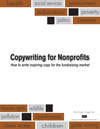I received a telemarketing call last week from a charity. However, it took some effort to figure that out.
At first she only identified herself as Rachel and asked how I was doing. I was puzzled. She talked like she was a friend of mine yet I couldn’t place her.
The only Rachel I know is my niece and the voice on the phone did not belong to my niece.
So I politely and patiently asked again, “Who are you and who are you with?”
That’s when I found out the charity she represented. Then she said they wanted to mail a letter for me to give again – another donation like my recent one.
Once again I was puzzled. I didn’t remember giving a donation so I asked, “When did I send in my last gift?” Answer: 2 years ago!
Folks, two years isn’t recent in the minds of most donors. A few months – yes. A few years – no.
What’s my point?
This experience highlighted a problem that I see in a lot of letters, email, tweets, and other messages from nonprofits: The prevailing tendency to assume a level of knowledge that just isn’t there.
Don’t assume donors know much about your organization.
Don’t assume donors remember their last gift – date or amount.
Don’t assume donors consider you their pal and want to chit-chat; especially when they don’t even know who they’re talking to yet.
Don’t assume donors remember everything you’ve told them or everything you’ve written to them (because they probably only read a fraction of it).
All those assumptions lead to annoying communications. In other words: Your letters, emails, phone calls and so forth end up annoying donors.
Yes you need to be friendly. Yes you need to be warm and talk like you’re conversing with a friend. But recognize that donors are more like an absent-minded acquaintance.
Bear that in mind as you write telemarketing scripts, direct mail letters, emails, etc.
YOU know the subject inside and out. And you KNOW you told donors about it before so why bring it up again? Because if you don’t repeat the message then the assumption of knowledge you’ve made leaves a lot of questions unanswered in the minds of donors. You need to tell them more. You need to repeat yourself.
Once again I recommend you THINK LIKE AN OUTSIDER. THINK LIKE A DONOR and not a 2, 5 or 10 year employee of your nonprofit.
Even if a donor or member has been supporting your nonprofit as long as you’ve been an employee, their knowledge level is a fraction of what yours is.
Write and talk in a friendly manner to a stranger … to an absent-minded aquaintance. You see, we really don’t know you that well.
Read more on this topic in these related posts:
Why People Do Not Give to Your Charity
Nonprofit Copywriting by Drayton Bird (Well known and respected direct response copywriter and direct marketer from the UK; over 50 years experience)

{ 2 trackbacks }
{ 0 comments… add one now }